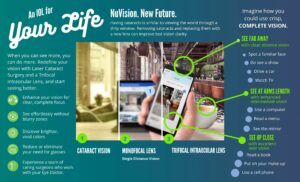Best Lens for Cataract Surgery in 2022
If you or a loved one is scheduled for cataract surgery, you may be wondering what kind of lens to choose. Intraocular lenses (IOLs) are implanted during cataract surgery to replace the eye’s natural lens. There are many different types of IOLs available, and the best type for you will depend on your individual circumstances.

Best Lens for Cataract Surgery 2022
No single IOL is best for everyone. To choose the right one for your cataract surgery, we evaluate four key factors:
- Desired range of vision
- Whether astigmatism correction is required
- Cost
- Presence of any other eye conditions
Reviewing these factors will help us decide on a standard monofocal lens, or a premium presbyopia-correcting lens, of which there are several types.
Best IOL for Cataract Surgery
In this post, we’ll give you an overview of the different types of IOLs available and help you choose the best one for you. We’ll also provide an update on the latest developments in cataract surgery lens technology so that you can make an informed decision about your surgery.
Types of Intraocular Lenses
There are many types of IOLs including monofocal, multifocal, extended depth of focus (EDOF), accommodating and LAL (Light Adjustable Lenses).
- Monofocal IOLs: Monofocal IOLs correct vision at a single distance, usually far away. Monofocal IOLs are the most common type of IOL, and they have been used in cataract surgery for many decades.
- Multifocal IOLs: Multifocal IOLs correct vision at multiple distances. They usually allow patients to see clearly at distance, intermediate, and near range without glasses or contact lenses. Multifocal IOLs are newer than monofocal IOLs and have also been around for many years.
- Accommodating IOLs: Accommodating IOLs mimic the eye’s natural focusing ability by changing shape when the eye muscles contract. This type of IOL shows promise for being able to correct vision at multiple distances.
- Extended depth of focus (EDOF) lenses: Intended to provide a smooth transition between vision over intermediate to long distances. These lenses are best for people who desire crisp, clear distance and mid-range vision, and don’t need to do as much close-up focusing in their day-to-day life, as well as people who do a lot of nighttime driving.
- The Light Adjustable Lens™ from RxSight® (LAL): An innovative IOL that is the only lens that can be adjusted after surgery to allow for a precisely customized prescription. Patients who receive this lens will come in for several quick, painless UV light treatments in the weeks after surgery. It is necessary to wear UV-protective glasses until your lens prescription is finalized. The LAL can provide accurate vision that enables many patients to eliminate the need for glasses after surgery.
Cataract Lens Technology
Another type of accommodating IOL called the IC-8 Lens made by AcuFocus has been recently FDA approved. The Apthera IOL is the first and only non-toric extended depth of focus IOL approved for the 82% of cataract patients who have as much as 1.5 D of corneal astigmatism.
Leading Lens Choice for Cataract Surgery: Trifocal IOLs
Alcon’s Panoptix Trifocal Intraocular Lens provides clear vision at all three visual ranges: distance, middle and close-up. This represents a pretty astonishing technological advancement. Patients who opt for this lens usually enjoy full independence from glasses post-surgery. Occasionally, a patient may require glasses for reading very small print. The Panoptix Trifocal can also correct astigmatism.
Choosing The Right IOL Lens for Cataract Surgery
There are many different types of intraocular lenses (IOLs) available, and choosing the right one depends on your individual circumstances and preferences. In this blog post, we’ve given you an overview of the different types of IOLs as well as some exciting new developments in cataract surgery lens technology that are available in 2022. If you have any questions about which type of IOL would be best for you and your laser cataract surgery, please don’t hesitate to contact our office today!
Be sure to talk to one of our doctors about not only the benefits of vision correction, but also any risks of vision correction that may pertain to your individual needs and circumstances.

